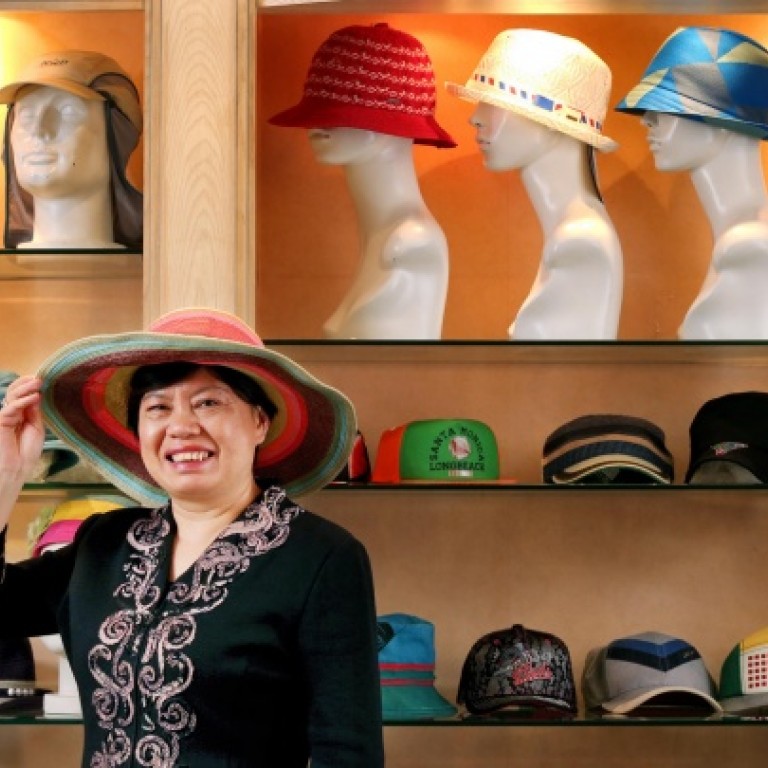
Manufacturing hat-trick
Labour unrest has hit Pauline Ngan Po-ling's relocation of hat-making production to Bangladesh, despite the low wage costs
Pauline Ngan Po-ling, deputy chairman and managing director of Hong Kong-listed Mainland Headwear, has stepped up to deal with yet another challenge in her decades-long career as an entrepreneur.

But last week she fell victim to a call for a nationwide strike by textile workers after the collapse of a garment factory outside the country's capital city of Dhaka, which killed more than 1,000 workers.
The strike temporarily shut down her factory, and though production resumed this week, Ngan said the worry of political uncertainty remained.
Nonetheless, the company is still looking to move 30 per cent of its total production capacity from mainland China to Bangladesh by the middle of next year. Besides the attraction of low wages, she said, imports from Bangladesh enjoyed an exemption from duties in Europe.
Ngan, the third daughter of a Fujian family of six children, came to Hong Kong in the 1980s. The family flourished and all six children went on to establish their own businesses.
Ngan and her husband Ngan Hei-keung set up a label printing business in 1984, which later expanded into cap and hat making and led them to open their first factory in Shenzhen in 1992.
The rest is history. Mainland Headwear, which is chaired by her husband, expanded into three factories on the mainland with over 3,500 staff making hats for a number of international brands.
The company was listed on the Hong Kong stock exchange in 2000 and attracted worldwide attention when it made hats for spectators and tourists as souvenirs when they attended the Beijing Olympic Games.
In an interview with the Pauline Ngan talked about how she coped with the lean times and also the recent tragic events in Bangladesh.
When we first opened our factories in Shenzhen in the early 1990s, the salary for a Shenzhen worker was just HK$400 a month. Twenty years on, the wage has increased 10 times to about HK$4,000.
But over the same period the prices of hats did not increase much, and our profit margin was being squeezed substantially.
Under the circumstances we had to pay much more attention to management and cost control. I hired a Taiwanese senior executive who was good at cost control and could use computer systems to enhance work efficiency.
Cost control was what led us to set up a plant in Bangladesh, where wages for a garment worker are similar to what they were in Shenzhen 20 years ago.
Business operating costs in Bangladesh may be cheap but the political situation is not stable, demonstrated by the strike last week. I hope the situation can be resolved soon.
Bangladesh would be a good place for a manufacturer to operate in if it were not for the political uncertainty. It has a lot of workers who want to find jobs. Many are very hard-working and keen to learn.
In the early 1980s I earned about HK$2,000 a month and my husband earned only HK$1,000. We dreamed of buying our own flat but on such modest incomes we were far from being able to buy our dream home.
So we decided to set up our own business, and we chose to make caps and hats as it did not require much capital and we did not have many competitors. It proved to be a good choice.
Definitely. Listing not only brought in new capital but also led us to upgrade our management and corporate governance to meet with stock exchange requirements.
Those losses were a painful lesson to learn. We produced profits since our listing in 2000 and until 2007. In 2008 and 2009 the global financial crisis hit our orders hard. In addition, we did not read the details of a contract before we signed it and that led to the company losing money.
To achieve the turnaround I invited a new partner - United States-based New Era, the world's largest headwear company - to become a shareholder. The new partner injected capital and guaranteed orders for our company, and also helped us to upgrade our technology and product design.
I need to give a vote of thanks to my husband. He is the chairman of the company and he supported me to set up the business with him instead of expecting me to stay at home.
Without my husband's love and support I would never have been able to play such an active role in negotiating deals with business partners and customers, and meeting the press and other stakeholders.
My grandmother. She became a widow at the age of 32 with six children, including one born after the death of my grandfather. But she brought up the children alone with no complaints.
She had a strong character while at the same time she was a caring person with excellent communication skills. She had good relationships with everybody from the cleaner on the street to the political leaders in our hometown in China.
I learned a lot from her about how to work and take care of the family at the same time; how to cope with difficulties; and how to keep on good terms with different people.

